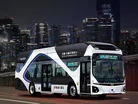IDTechEx: Autonomous Buses: for a Future Mobility

The autonomous bus industry is poised for a transformative journey as it approaches broader adoption in 2024. These buses represent some of the most complex platforms within the autonomous driving sector, primarily due to their large size and the intricate operational design domains (ODD) they must navigate.
Unlike smaller autonomous vehicles such as roboshuttles and robotaxis, autonomous buses interact with diverse road users, including pedestrians, cyclists, and other vehicles, making their operational demands significantly more complicated.
The vision for a sustainable future
Henrik Henriksson, CEO of H2 Green Steel and previously CEO at Scania, highlights the potential of autonomous buses as a natural extension of the company's vision for a sustainable future, noting: "Autonomous buses not only reduce emissions but offer safer, more efficient transport solutions for urban environments."
The vision aligns with the broader goals of reducing urban congestion and enhancing public transportation efficiency through advanced technology.
Complex operational demands and slow progress
The complexity inherent in autonomous bus operations has slowed their development, particularly due to stringent regulatory requirements and the sluggish progress of Level 4 (L4) autonomous systems. Shihao Fu, a Technology Analyst at IDTechEx, emphasises the critical role of government support in advancing autonomous bus projects.
Despite these challenges, autonomous buses remain a vital component of future urban infrastructure, with various projects worldwide beginning to demonstrate their potential value.
A decline in active players yet promising developments
Over the past two years, the number of companies actively developing autonomous buses has decreased by 18%, from 21 to 18. The decline is primarily attributed to the challenges of developing city buses, which require more advanced autonomous systems and face more significant regulatory obstacles.
However, not all segments of the autonomous bus industry are experiencing the same slowdown. The expectation is that Minibuses and midibuses will lead the way in commercialisation over the next few years.
Shihao Fu points out ongoing developments, noting that "two city bus projects are still moving forward with commercialisation, supported by strong backing from various stakeholders, including the government." For instance, in Seoul, Hyundai launched two L4 Automated Driving System (ADS) night bus services in December 2023.
These buses operate on a 9.8 km route from Hapjeong Station to Dongdaemun Station and have transitioned to paid services, marking a significant milestone for the industry.
The transition from small-scale trials to commercial testing
Many autonomous bus companies are moving from small-scale trials to commercial testing phases. Shihao Fu asserts, "Given the current limitations of autonomous bus operations, particularly in achieving fully driverless functionality, large-scale testing may not be necessary or practical at this stage."
Instead, companies focus on smaller, more manageable trials with expansion plans as technology and regulatory environments evolve.
Roboshuttles, designed for deployment in large numbers within confined areas, offer operational diversity and are more feasible for large-scale trials. However, the higher capacity of buses means fewer vehicles are necessary per route, and the longer routes typically associated with bus operations present additional challenges.
These factors make deploying large fleets of autonomous city buses less practical for testing purposes.
Looking Ahead
The autonomous bus industry is at a critical juncture, with significant challenges to overcome but considerable opportunities for growth. As companies transition from testing to commercialisation and governments continue to support these initiatives, the future of autonomous buses looks promising.
With continued innovation and collaboration, vehicles could soon become a common sight on roads worldwide, leading to urban mobility solutions.
- BYD Surpasses Tesla in Quarterly Sales Amid EV Market ShakeuMobility
- SMMT: Car Manufacturing Challenges Amid Industry PressureMobility
- Charge Gully: Bridge EV Gaps for Deprived AreasCharging & Infrastructure
- Emporia & Treehouse Simplify Home EV Charging & InstallationCharging & Infrastructure


